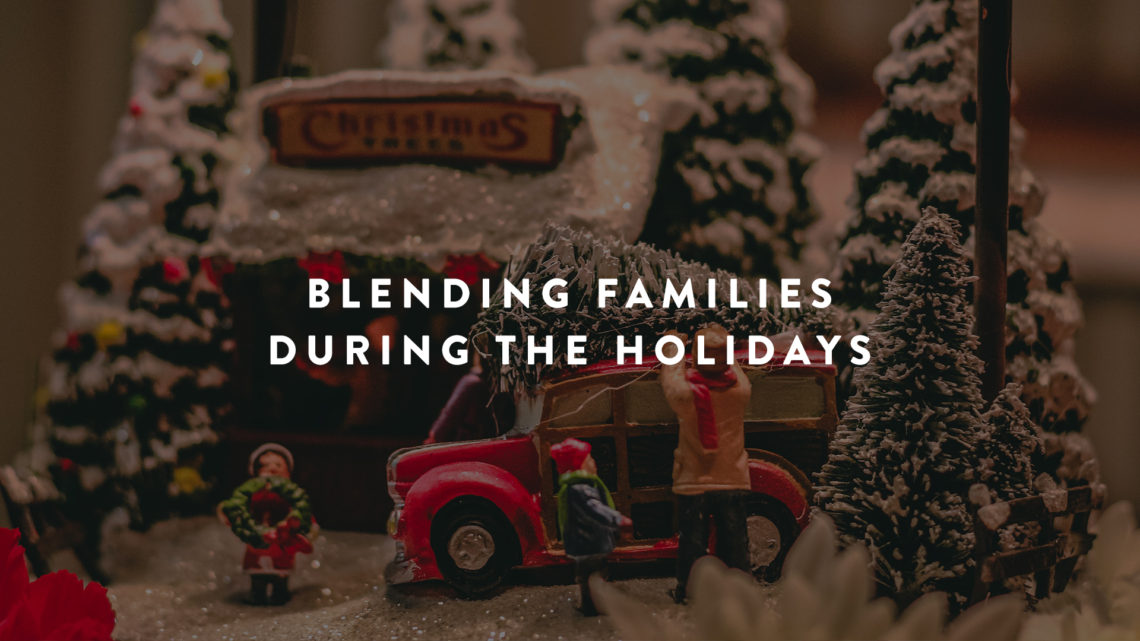
It was our first Christmas Eve, the dishes were piled in the kitchen after a traditional New Mexican meal of Posole and fresh-made tamales. The tree was glistening and Christmas music filled the house. Fresh baked cookies and homemade candies overflowed tins to the delight every sweet tooth in the house. Every detail was perfect… but every heart, was a little on edge. See, it was our first Christmas together as a newly blended family. Even as I write these words, a lump forms in my throat thinking about all the emotions associated with those first few holidays as a new “blending” family.
Blending families is a sensitive and tender undertaking. It takes patience, grace and an overwhelming amount of love and emotional health. Every new “first” seems to bring with it the weight of all of the bundled up emotion that we try to keep pushed down, but lie just under the surface. And if there was ever a season that elevates these emotions, it’s the holidays. Parents are excited to share traditions, start new ones and have some “happy holiday” moments. We can do this to the point, as a newly blended family, that we can put on rose-tinted glasses and ignore the realities that are happening within our kids.
Our kids are navigating unmarked territory. They love both of their parents, and they want to be loyal to both of their parents, and depending on what phase your children are in and how you’ve helped them through divorce and blending, their reactions and responses during the holidays may vary. Where once they loved every part of the holidays and were all-in for all of the traditions, treats and treasures, they might now seem aloof and distant or cranky and out-of-control. Even their favorite “thing” might seem we’ve asked them to step on hot lava. Or you might have the child who wears themselves out, hopping from one thing to another, from one house to another trying to keep both sets of parents “happy”. And all the while as parents, our hearts are a little bit (or a lot bit) broken because at our very core, this isn’t what we wanted for our kiddos. We never thought we’d be divorced, we never thought that we’d be navigating these kind of waters, but God is good and God redeems our broken pieces and God restores. And in all that there is a process that comes with restoration.
This might sound bleak and you are probably thinking, “Is this ever going to be easy?” On the lighter side, I don’t think the holidays are ever “easy,” but I do know that there will be a moment when you realize that you’re not manufacturing energy around the holidays anymore, and there is an ease to it again. Take heart, because by employing some intentionality, you can create holiday moments that will be remembered with warmth, security, and deep love. Here are some thoughts and ideas for your holiday blueprint:
1. The Golden Rule
Treat others the way you want to be treated, with respect, honor, dignity, and love. This might seem obvious, but so many times there is a battle for significance between your family and the “other” family, even between you and your spouse. Put the needs of others ahead of your needs. This might mean that the kids go to their other house for a last minute scheduling change on an evening when you had planned something at home. Consider what is best for the child. I’m not suggesting that we completely acquiesce at every request, but there is something to the saying, “What goes around, comes around.”
2. Rules of Engagement
Don’t play dirty. ONLY speak kindly and respectfully of your child’s other parent(s). You should be your child’s greatest advocate, which means to be the advocate and cheerleader for every person of influence in their lives. This doesn’t mean you have to agree with their lifestyle, parenting style, or methods, but it does mean that you are a champion for them because they are an important part of your child’s life. This requires a great deal of spiritual and emotional maturity. Remember, kids are keen observers of their worlds, but horrible interpreters. They will interpret your every word and action one way or another. Teach them by example that we can love people without completely understanding them or agreeing with them.
3. Focus on the Celebration, Not the Day
In blending families, holidays, birthday, and other significant days have to be shared. This means that most special days are going to be doubled-up (aka; your child now gets two special days). Make the most of the moment you actually celebrate and less on the “day” you’re supposed to celebrate. This is actually true for families that aren’t blending too. If a parent has to work on a holiday or birthday, family is coming after the fact, etc . . . we still celebrate, but on a different day. The point is, the parent who is celebrating on an off-day because it’s not their year, can still make the most of the moment, and celebrate in a meaningful way.
4. Keep the Main Thing, the Main Thing
In preparation to write this post, I talked to our daughter about what she experienced while I was single and after we blended families. One thing she said that stuck out to her, and filled my momma’s heart, was although it seemed that the magic of Christmas had suddenly evaporated at 11 years old, she loved that at Mom’s house, Christmas was simple. It was about what Christmas meant, and how we lived that out. It wasn’t flashy, extravagant or over-the-top. Her advice, as a now young mom and wife, is to keep the main thing the main thing. As parents, we carry a lot of guilt for the struggle and complexity divorce and re-marriage can add to a child’s life. Sometimes we can fall into the rut of “buying” our kids with lots of gifts or trips. More than “things,” your kids just want you, and they want to know that you are there, you hear them, you see them, and you will take TIME to be with them. Do that.
As much as four simple points might seem obvious, it’s hard. It’s hard to not let our emotions and past history dictate what we will do today. It takes an extreme amount of intentionality. One of the axioms we say around here regarding parenting is, parent with the end in mind. This means that we spend some time considering who and what we want our children to be as adults. That vision of our grown-up kids informs how we parent today. As a couple, my husband and I needed to decide early on that we were going to be champions of “our” kids. If you’re blending, those are YOUR kids, not his, not hers, but yours.
The hardest part for me has been managing my own sadness and loneliness around the holidays. I love people, I love a full house, and I love having my chicks (and now grand-chicks) around. I love the crazy chaos that comes with a house-full of people. It was hard when John and I were alone on the holidays, because our kids with their other parents. These were the times that I spent in quiet, grateful reflection. I prayed for them, for their other parents, for us and for their futures. Now that our kids are all grown and in their 30’s, one of the things I’m learning is that because we helped them navigate this well when they were young, we actually helped them created healthy holiday expectations now that their grown. They’ve learned that they can have healthy boundaries, they spend some holidays at their own homes, some with us and some with their other parents. We love seeing how being intentional early on, has influenced their families in healthy ways. We’re counting it all joy.





